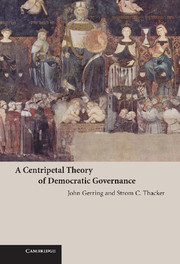Book contents
- Frontmatter
- Contents
- List of Figures
- List of Tables
- Acknowledgments
- A Centripetal Theory of Democratic Governance
- 1 Models of Governance
- PART ONE CAUSAL MECHANISMS
- PART TWO EMPIRICS
- 5 Hypotheses
- 6 Cross-National Tests
- 7 Assessing the Evidence
- PART THREE CONCLUSIONS
- Appendix A Defining Good Governance
- Appendix B Alternative Theories Revisited
- Sources
- Author Index
- Subject Index
7 - Assessing the Evidence
Published online by Cambridge University Press: 06 July 2010
- Frontmatter
- Contents
- List of Figures
- List of Tables
- Acknowledgments
- A Centripetal Theory of Democratic Governance
- 1 Models of Governance
- PART ONE CAUSAL MECHANISMS
- PART TWO EMPIRICS
- 5 Hypotheses
- 6 Cross-National Tests
- 7 Assessing the Evidence
- PART THREE CONCLUSIONS
- Appendix A Defining Good Governance
- Appendix B Alternative Theories Revisited
- Sources
- Author Index
- Subject Index
Summary
In chapter six, we presented evidence of a causal relationship between centripetal institutions – as embodied in Unitarism, Parliamentarism, and Closed-List PR and in a combined variable, Centripetalism – and good governance. In this chapter, we critically assess the plausibility of these apparent relationships and reconsider our choice of methods.
In doing so, we are fully cognizant of potential problems and limitations. We have already mentioned the generic difficulties that affect any study focused on basic-level constitutional institutions and distal governance outcomes. There is little change in these institutions through time, so the leverage for causal analysis comes mostly from spatial variation. Yet, across-unit heterogeneity is extreme, requiring the inclusion of myriad control variables, which can never fully compensate for the nonexperimental characteristics of the research design.
These sorts of difficulties prompt some methodologists to forswear use of cross-national regression techniques, a conclusion we find a bit extreme. The relevant question, in our view, is not whether a given method stands above some imagined bar of acceptable truth-probability, but rather whether it offers the best possible empirical test of the question at issue. We think that our approach to these questions satisfies the practical test of human knowledge. Ours is emphatically a pragmatic, not an absolute, epistemology.
Problems of Robustness, Briefly Considered
We begin with the problem of nonrandomized treatment.
- Type
- Chapter
- Information
- A Centripetal Theory of Democratic Governance , pp. 143 - 154Publisher: Cambridge University PressPrint publication year: 2008



